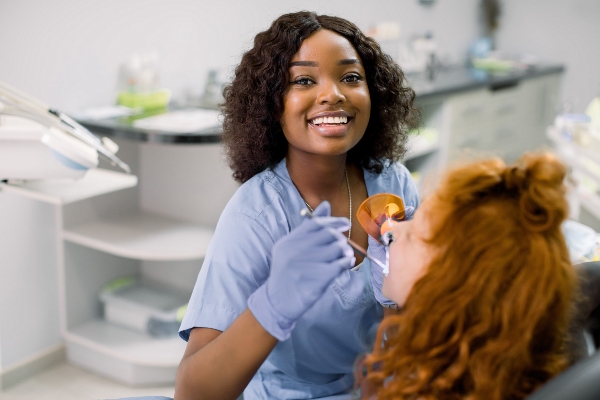Cavity Prevention With a Routine Dental Exam

A routine dental exam can help prevent dental cavities by detecting the early signs of enamel decay. If necessary, the dentist can take action to strengthen enamel so a cavity does not develop during a routine dental exam. This article provides a more in-depth review of the purpose and benefits of regular dental visits for cavity prevention.
The importance of a routine dental exam for cavity prevention
A routine dental exam is encouraged every four to six months. Patients that do not visit the dentist regularly for preventive purposes are at a much higher risk of a range of oral health concerns, including cavities, periodontal disease, and more.
What is a routine dental exam?
A routine dental exam is a dental visit designed to check on the status of the patient's oral health. It is used as a form of preventive dentistry, and the goal is to detect any issues as early as possible to avoid worsening concerns that could be costly and invasive to address with restorative care. The visit typically involves an oral examination, during which the dentist thoroughly checks every tooth and area of the mouth. Dental x-rays may also be ordered for a more comprehensive examination of the patient’s oral health.
How can a routine dental exam help prevent cavities?
A routine dental exam allows a licensed dentist to check on the status of dental enamel, which is the outermost layer of teeth. Cavities form when this outer layer of teeth becomes worn down by acidic attacks, which are brought on by a combination of bacteria and food and drink particles such as sugar. If enamel is weakened, then the dentist may recommend a dental cleaning and/or a fluoride treatment plan to restrengthen and remineralize the enamel before cavities form.
What else can a routine dental exam help prevent?
A routine dental exam not only helps prevent the formation of dental cavities but can also help with the early detection and prevention of various additional concerns, including periodontal disease, bruxism, and cosmetic issues. Many routine dental exams also involve a cleaning to help prevent many of these more common oral health problems.
How can I protect my teeth from cavities between visits?
Although a routine dental exam and cleaning is a great way to protect your smile from cavities and other oral health concerns, the majority of work takes place at home between dental visits. It is important for patients to implement a consistent oral care regimen that involves brushing and flossing regularly. It is also encouraged to check for any signs of weakened enamel or cavities as well, such as a discoloration of the enamel, gum discoloration, and gum swelling.
Additional tips for cavity prevention
Routine dental exams with a licensed dentist are perhaps the best way to detect the earliest signs of cavities and help prevent cavities from developing. However, there are additional tips to implement to help prevent cavities.
Consider cavity prevention treatments from your dentist
Dentists offer certain services that are designed to reduce the overall risk of cavities. For patients that are at a higher risk of developing cavities, such as those who have a personal or family history of cavities, it can help to have additional prevention treatments.
Notably, this includes fluoride treatment, which is provided in the form of a mouthwash. This is helpful to reverse the earliest stages of cavities (i.e. weakened enamel) before holes officially develop in teeth. Dental sealants are also an option to help prevent cavities. Sealants are plastic coatings that are placed over the chewing surface of molars and premolars. They are more common for younger patients, but they work well for adults as well.
Limit the consumption of sugar and other carbohydrates
Sugar, starch, and other carbohydrates are known to combine with bacteria that naturally occur inside the mouth and cause an acidic reaction, which breaks down the enamel and leads to cavities. In addition to keeping the mouth as clean as possible, consuming fewer carbohydrates can be an effective cavity prevention strategy. Additionally, tobacco products and alcohol can also have a detrimental impact on enamel and increase the risk of cavities as well.
Call our dental practice to schedule a routine dental exam
Has it been more than six months since your last dental visit? If so, call our dental practice today to schedule a routine dental exam and teeth cleaning to protect your smile from cavities and other oral health concerns.
Are you considering a dental exam in the Los Angeles area? Get more information at https://www.alluredentistry.com.
Check out what others are saying about our dental services on Yelp: Routine Dental Care in Los Angeles, CA.
Recent Posts
Routine dental care is vital for anyone striving to achieve optimum health. Dentists recommend two preventative dental visits per year, but much can happen between visits; therefore, it is crucial to get the most out of each appointment.Professional cleanings are an essential component of routine dental care and can remove plaque and tartar below the…
When it comes to health and wellness, prevention plays an integral role. In addition to making healthy lifestyle choices, practicing routine dental care is a vital step in maintaining a healthy mouth and body. There are numerous benefits for patients who commit to proper home and professional dental care.Routine dental care is necessary to maintain…
A crucial component of being healthy is routine dental care. When oral health is ignored, harmful bacteria can compromise the rest of the body. Healthy dental practices involve a two-prong approach of visiting the dentist regularly and continuing oral health care at home. Discover more about what is considered routine and effective dental care practices.Making…
Maintaining routine dental care is important for oral and overall health, but many patients have questions about what it consists of beyond daily brushing and flossing. The right answers can help patients of any age understand the importance of providing optimum care for their teeth and the possible issues if they fail to follow through.…


